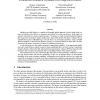Free Online Productivity Tools
i2Speak
i2Symbol
i2OCR
iTex2Img
iWeb2Print
iWeb2Shot
i2Type
iPdf2Split
iPdf2Merge
i2Bopomofo
i2Arabic
i2Style
i2Image
i2PDF
iLatex2Rtf
Sci2ools
PODC
2009
ACM
2009
ACM
Concurrent imitation dynamics in congestion games
Imitating successful behavior is a natural and frequently applied approach to trust in when facing scenarios for which we have little or no experience upon which we can base our decision. In this paper, we consider such behavior in atomic congestion games. We propose to study concurrent imitation dynamics that emerge when each player samples another player and possibly imitates this agents' strategy if the anticipated latency gain is sufficiently large. Our main focus is on convergence properties. Using a potential function argument, we show that our dynamics converge in a monotonic fashion to stable states. In such a state none of the players can improve its latency by imitating somebody else. As our main result, we show rapid convergence to approximate equilibria. At an approximate equilibrium only a small fraction of agents sustains a latency significantly above or below average. In particular, imitation dynamics behave like fully polynomial time approximation schemes (FPTAS)....
Concurrent Imitation Dynamics | Linear Latency Function | Parallel Computing | PODC 2009 | Singleton Congestion Games |
| Added | 25 Nov 2009 |
| Updated | 25 Nov 2009 |
| Type | Conference |
| Year | 2009 |
| Where | PODC |
| Authors | Heiner Ackermann, Petra Berenbrink, Simon Fischer, Martin Hoefer |
Comments (0)

